How Much Does The Champions League Affect Domestic Form?
We have taken a detailed look at the football fixtures over the last three seasons to try and uncover if there is any truth in the myth that teams from certain nations have greater help from their football associations in terms of the timing of their domestic fixtures immediately before and after European games.
Are the German Friday night games really organised to give the teams competing in the Champions League the maximum recovery time? The 2016/17 season in the English Premier league sees the introduction of regular Friday night fixtures for the first time in its history – so can English teams expect to see a difference in their recovery time between domestic and European competitions?
Also over the last three seasons, Spanish teams have made up 35% of the Champions League quarter finalists, and there has been a Spanish winner for the last three seasons running. Is there any correlation with this dominance and their recovery times to European games?
We have analysed the domestic league fixtures from six of the top leagues in Europe as well as all UEFA Champions League matches for the last three seasons (2013/14, 2014/15 and 2015/16). We have calculated the number of hours between the Kick-Offs of all European games and the immediately preceding & ensuing domestic league games.
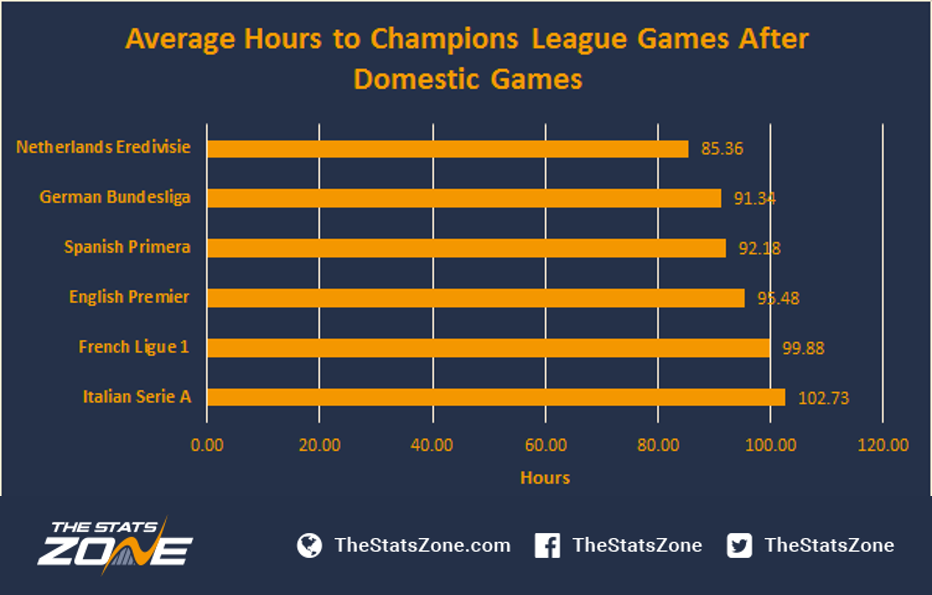
As we can see from the graph, there is quite a variation in the times between domestic league games and the following Champions League game for the various leagues. Interestingly, the German Bundesliga and Spanish Primera have some of the shorter recovery times, so it would appear that German and Spanish teams do not get a better deal.
The Italian Serie A has the longest recovery times of any league, although Italian teams have not done very well in the UCL in the last few years, with the exception of Juventus who were runners up in 2014/15. How about specific teams in a league? Are there some teams who get more recovery time than others? Let’s take a look at the recovery times for teams in the Bundesliga.
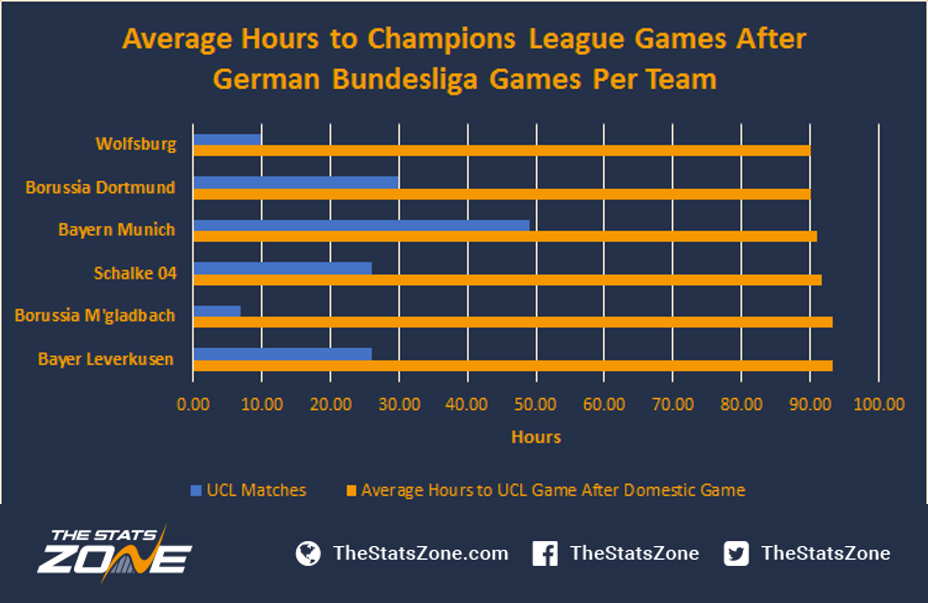
It is pretty consistent across all teams, in fact, looking at all the leagues there is little variation between the teams, with perhaps the exception of the French Ligue 1.
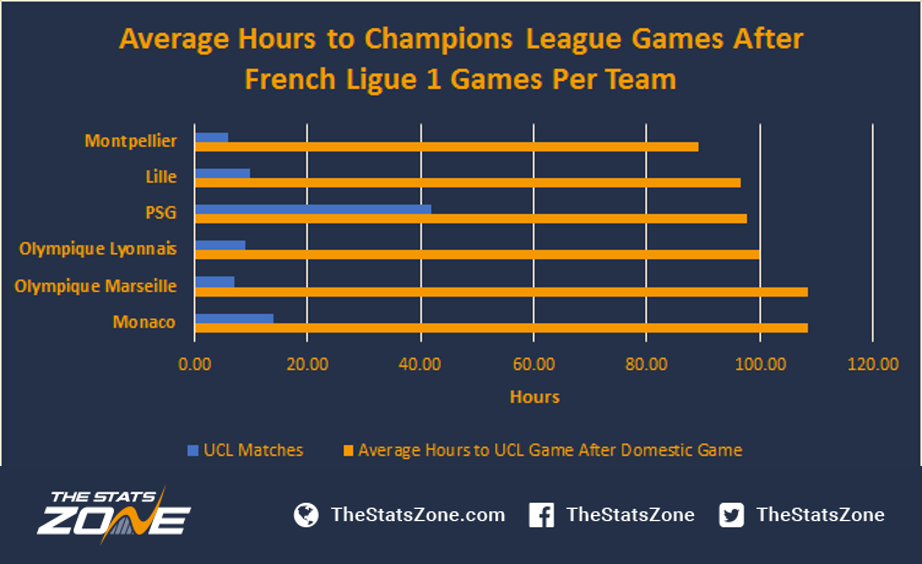
Monaco and Olympique Marseille do seem to have benefitted from slightly longer recovery times than their counterparts.
What about the recovery times to the subsequent domestic matches? Do some teams get a longer rest after their Champions League games?
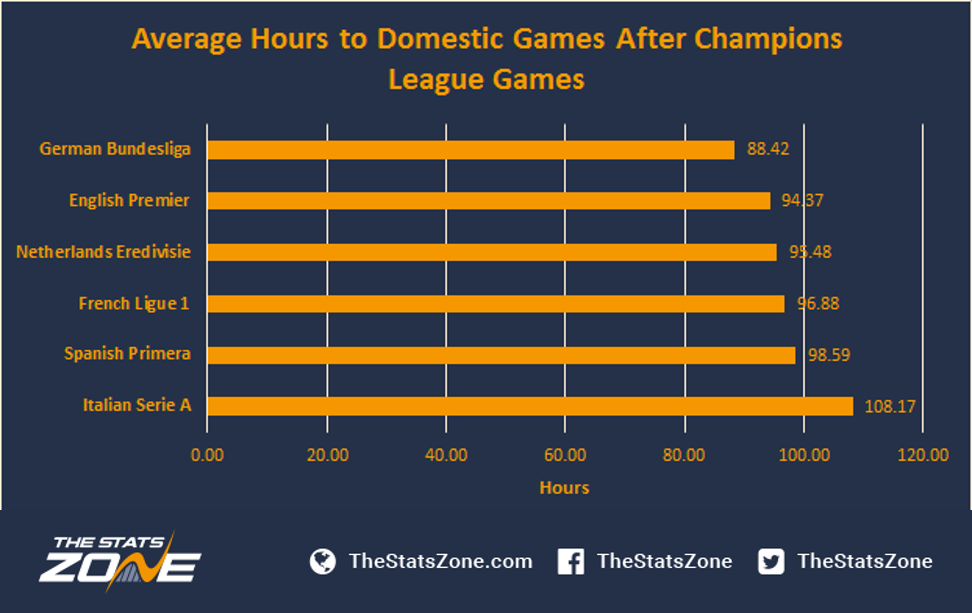
You can see the Italian teams also have the longest recovery times to domestic matches after UCL matches. This would suggest the Italians have the most balanced domestic fixture list of all the leagues.
If we take a look at individual teams we can see that again there is little variation, with no teams getting any real advantage over their counterparts, for example the following chart shows the recovery times for teams in the English Premier league.
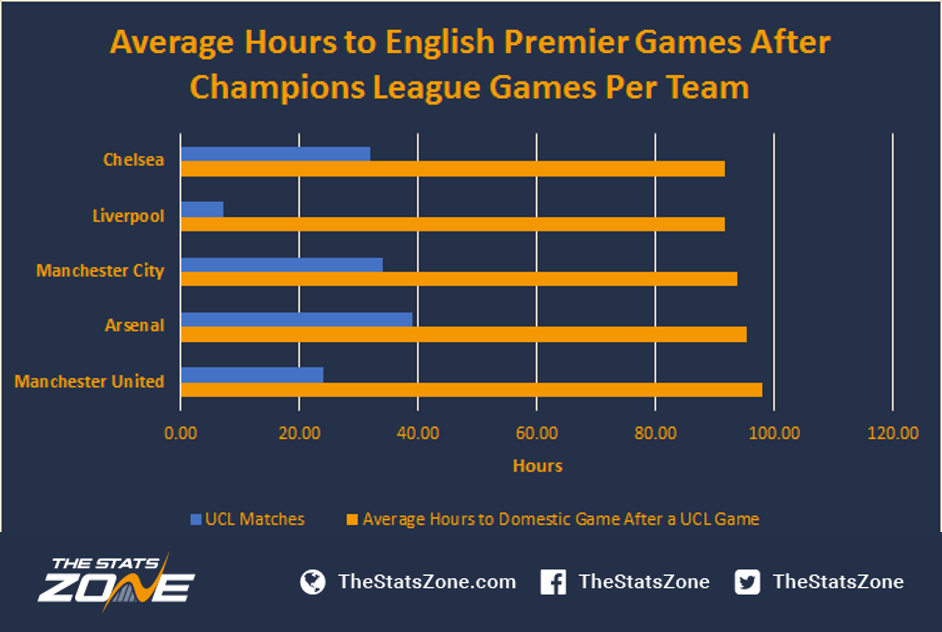
The French Ligue 1 again has the most variation with Monaco and Olympic Marseille also benefiting from slightly longer recovery times to their domestic games.

Having taken a look at how the recovery times vary across leagues and teams, let us now look at how the points scored in domestic games varies before and after UCL matches.
The following graph shows the average points won across all teams competing in the UCL for each league, versus the points won in their matches directly after a UCL game.

In most leagues there is a drop in the average – particularly in the Bundesliga, which of course had the shortest recovery times following UCL matches. Despite having the longest recovery times, the Italian teams competing in the UCL do not perform well after UCL games. The Dutch teams are the only teams who perform significantly better after UCL games.
For points won in matches preceding UCL matches, we can see from the following graph that the Dutch teams competing in the UCL also do better in domestic matches directly prior to a UCL game than they do on average. The French and English teams competing in the UCL seem to struggle most in their matches prior to UCL games.
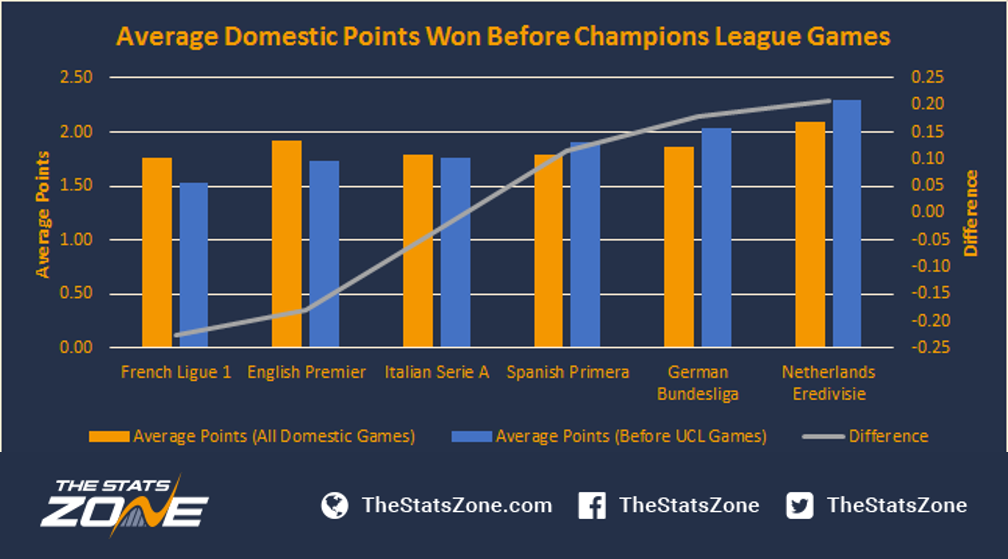
Finally, we have broken down the difference in points won before and after UCL matches by team.
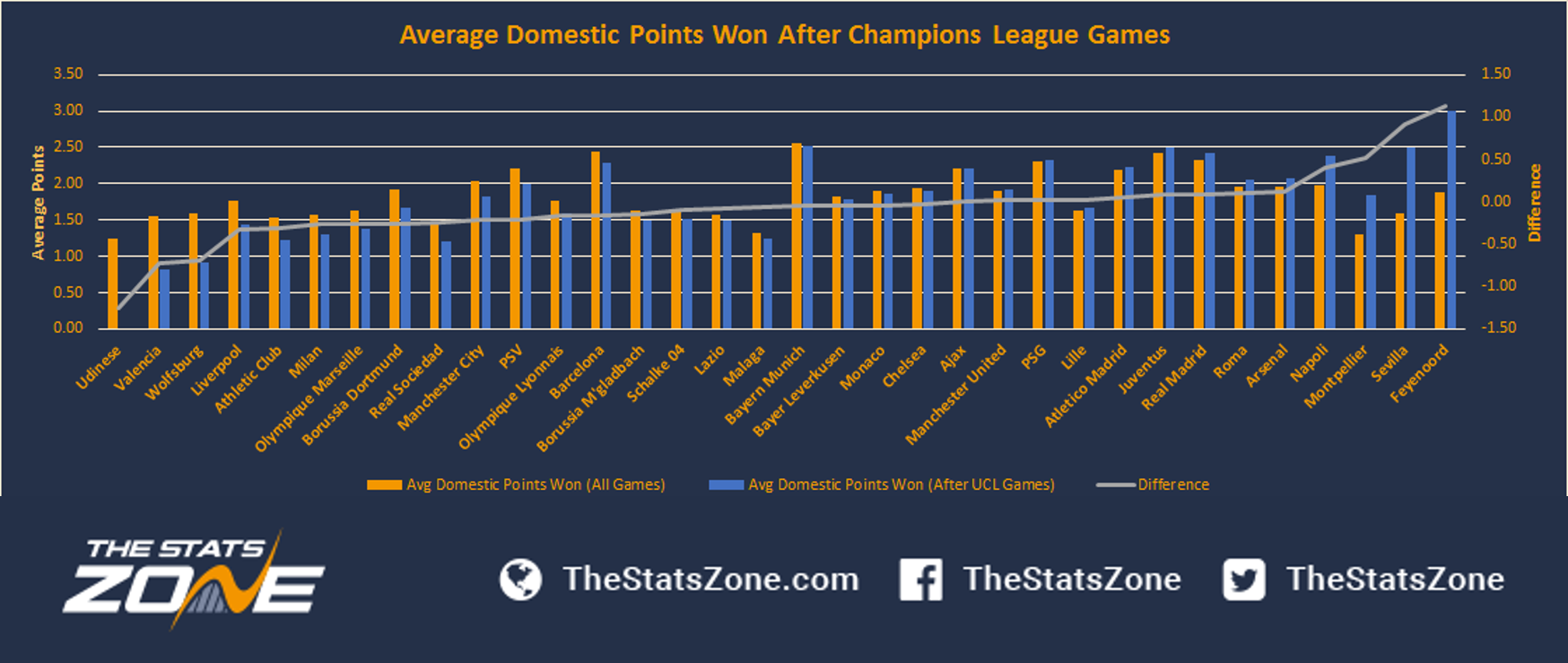
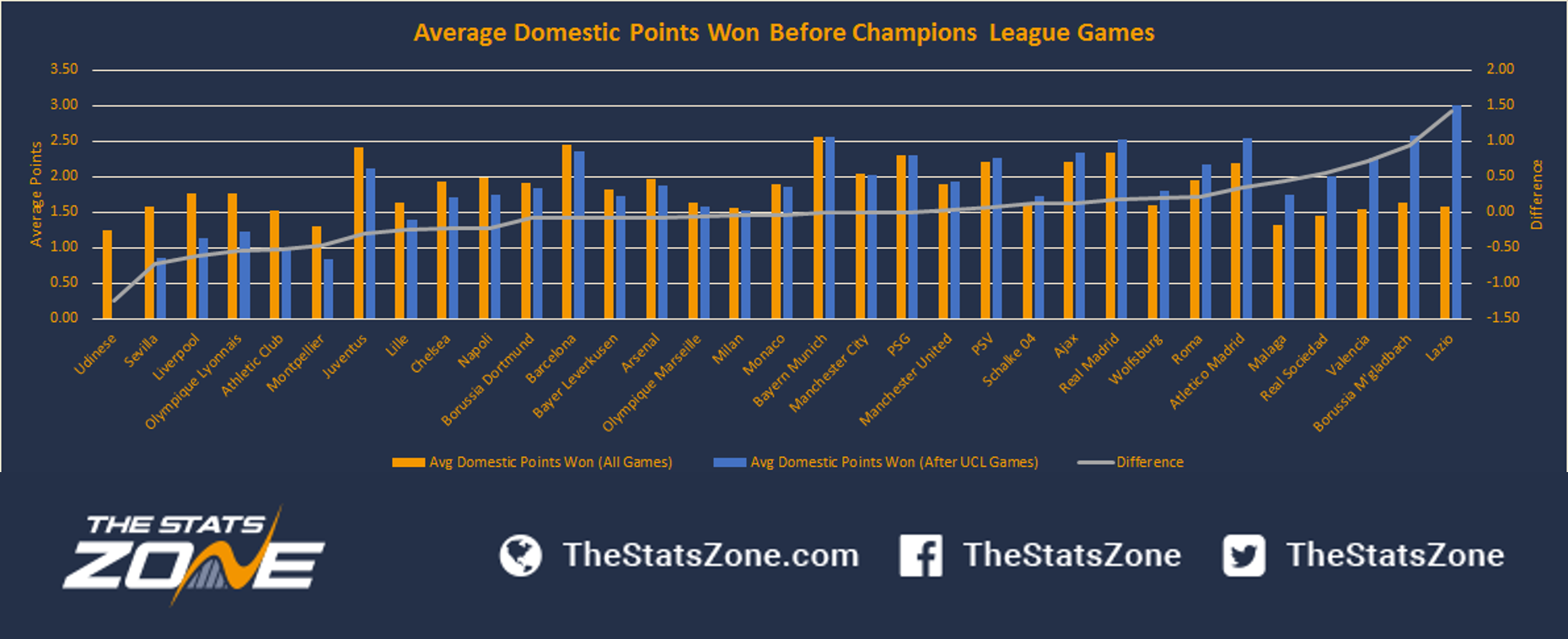
Liverpool fans will be concerned (but perhaps not surprised) to see their team struggle in games both before and after UCL games.
Interestingly, Sevilla do very well after UCL games but very badly before them and, conversely, Valencia perform well before UCL matches but very badly after them.
Manchester United and PSG are the most consistent teams before and after UCL matches, with the UCL matches seemingly having little effect on their domestic performance.
Data in this article includes all domestic league matches and UEFA Champions League matches for teams from the English Premier League, French Ligue 1, Italian Serie A, German Bundesliga, Spanish Primera league and the Dutch Eredivisie for the 2013/14, 2014/15 and 2015/16 seasons. Domestic cup games were not included. Hours between matches are the number of hours between kick off times. Domestic matches more than 7 days before or after a UCL match are not considered to be immediately before or after a UCL match.











